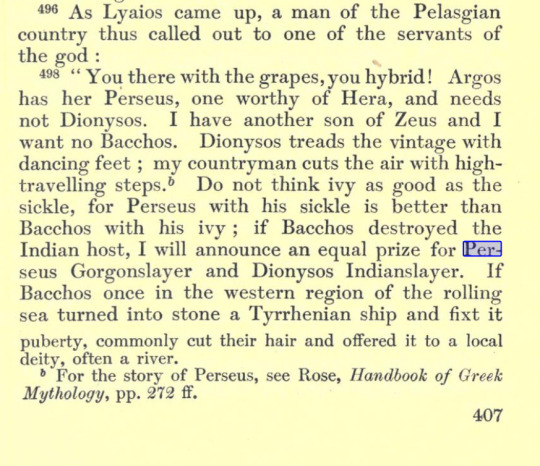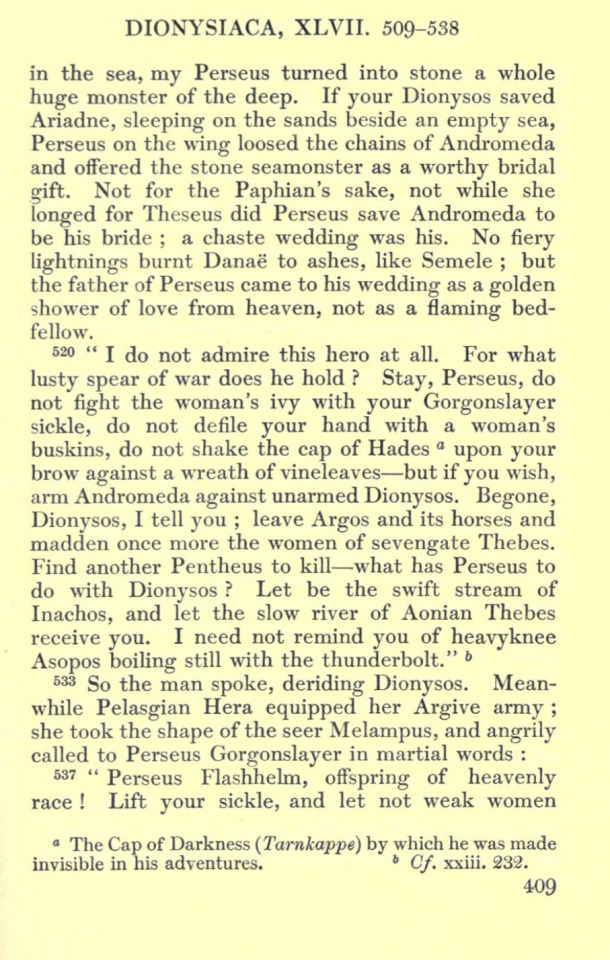#dionysiaca
Text
Apollo in the Iliad refusing to fight Poseidon out of respect and Apollo in the Dionysiaca going all out against Poseidon...I call that character development.
#Poseidon#Apollo#Apollo (probably): I don't want Artemis to call me a pussy again even though she got her ass beat by Hera for the second time#too bad Hermes intervened and the fight was stopped#well#maybe that was for the best#but yknow#i love when Greek myths have anime style battles in them#mine#Dionysiaca#Apollo info
150 notes
·
View notes
Text



I love how “Hera actually likes Perseus” isn’t just fanfic it’s literally true.
#Dionysiaca#greek mythology#greek pantheon#ancient greek mythology#hera#greek goddess#hera goddess#hera deity#zeus#danae#dionysus#perseus#also lol why did they say that even Andromeda can beat Dionysus#andromeda#medusa
54 notes
·
View notes
Text
the thing I had to learn about Nonnus and that you all need to know too is that it's basically Dionysos fanfiction
Nonnus wrote the Dionysiaca in the 5th century AD - compare that to Euripides writing in the 5th century BCE, Homer in the 8th century BCE, and many myths going back much further than that
I am not a classicist and am dumb about these timelines but even I can tell you that waiting a thousand years and then being like "I am going to write a long-ass epic about this one cool guy" when the culture around you has moved onto a different pantheon is a not the same as transcribing and building on the stories you are hearing in your daily life
somebody smarter than me can corroborate this with dates and context but tl;dr take Nonnus (and in particular the myths that ONLY appear in his writing) with a grain of salt
#nonnus#dionysiaca#hellenismos#myths#mythology#personal#discernment#Dionysos#I think it was jack faust who first helped me understand this#so shoutout to jack#catch me writing my hot takes about whoever was fucking shit up in the year 1023
81 notes
·
View notes
Text
Kinda want an Indian epic where they include the Dionysiaca and its elements along with the Hindu gods tryna protect India from Dionysus and the rest of the Greek gods involved, along with an epic Battle of the Gods at the end. Who wins? Idc.
#greek mythology#ancient greek mythology#greek myths#dionysos#dionysiaca#dionysus#dionysus deity#greek gods#hindu mythology#hindu gods#devas#hindu deities#desiblr#hindublr#desi tumblr#desi tag#desiposting#greek god#epic#epics#mythology
43 notes
·
View notes
Note
Wait what part of the Dionysiaca states that Hera keeps the dress she lost her virginity in? That’s so weird…
It is in the beginning of Book 32, in which Nonnos reworks the Dios Apate scene from Iliad 14 in his typical and infuriating long-winded way:
Aphrodite was won. The mistress of wiles obeyed the cunning request, and drawing the cestus up from her bosom she bestowed it upon willing Hera, and thus she spoke and described the witchery of the strap: ""Accept this strap to help your trouble. You shall charm all in one with this cestus, the guide to all desire — Sun and Zeus and the company of stars, and the evermoving stream of boundless Ocean."" This said, she plunged beneath the rocks of Assyrian Libanos. But Hera passed to the starscattered circle of Olympos. Quickly she decked out her allwhite body. Often she guided the straying clusters of floating hair and arranged them in even rows down to her forehead; she touched up the plaits with sweetscented oil — stir it, and the farspreading scent of the unguent intoxicates heaven and sea and the whole earth. She put on her head a coronet of curious work, set with many rubies, the servants of love; when they move, the Cyprian flame sends out bright sparklings. She wore also that stone which draws man to desire, which has the bright name of the desire-struck Moon; and the stone which is enamoured of iron the loveproducing""; and the Indian stone of love, offspring itself of the waters and akin to the Foamborn; and the deep blue sapphire still beloved of Phoibos. About her hair she twined that herb of passion which Cythereia loves as much as the rose, as much as the anemone, which she wears when she is about to mingle her love with Myrrha's son. She bound the unaccustomed cestus about and about her flanks; but the embroidered robe she wore was her oldest, still bearing the bloodmarks of maidenhead left from her bridal, to remind her bedfellow of their first love when she came to her brother a virgin in that secret union. She washed her face, and wrapt about her a shining robe and clasped it with a brooch to lock up her tunic. Having thus adorned herself and surveyed all in the mirror, Hera sped through the air, swift as a bird, swift as a thought.
7 notes
·
View notes
Text

Another dionysus art I drew :3 in the Dionysiaca he passes through assyria and meets a king named Staphylos, which means "cluster of grapes". I wanted to try and find the Akkadian translation, and the best thing I came up with was "Isḫunnu".
"Staphylos the grapelover attended upon Lyaios, offering him the guest's gifts as he was hasting for his journey: a two-handled jar of gold with silver cups, from which hitherto he used always to quaff the milk of milch-goats; and he brought embroidered robes, which Persian Arachne beside the waters of Tigris had cleverly made with her fine thread." - Dionysiaca, Book 18.
#dionysus#greek mythology#greek myths#greek gods#greek myth art#greek mythology fanart#dionysiaca#arties art
13 notes
·
View notes
Text
Abrim,
oversalted,
transpicuous,
big knotty penis
and gold all up in your grill
What would the fox say?
Anne Carson, Drápustúfr from Nonnus' Dionysiaca, Book 23
2 notes
·
View notes
Text
Nike, Greek Goddess of Victory and Zeus’s Charioteer of Glory | Ancient Origins
https://www.ancient-origins.net/myths-legends-europe/goddess-nike-0017383

View On WordPress
#Apollo#Ares#Artemis#Athena#Athena-Nike#Berlin#Bia#Brandenburg Gate#Charioteer#Cronus#Dionysiaca#Germany#Greek Mythology#Greek Pantheon#Hermes#Homer#Narva Triumphal Arch#Nike#Nonnos#Oceanid#Olympus#Pallas#Russia#St. Petersburg#Styx#Theogony#Titan#Titanomachy#Typhon#Vienna
3 notes
·
View notes
Text


14 notes
·
View notes
Text
‘Let Atlas join the fight / let him break off mountains / launch them against the sphere of stars / he once carried on his shoulders / let the Seasons run in panic […] / Zeus son of Cronus / will heft the spinning mass of heaven / onto his own shoulders / the load of Atlas / and there he will stand / biting back his rancor.’
Tales of Dionysus, book 2, by Nonnus of Panopolis (tr. by William Levitan).
#Nonnus of Panopolis#Tales of Dionysus#Dionysiaca#Greek literature#tagamemnon#Atlas#Zeus#Typhon#this poem is dope I cannot for the life of me get over it
5 notes
·
View notes
Text
I had not expected the Apollo vs Poseidon in the Dionysiaca to go so hard:
"And now a fiery chief stood up to the champion of the deep: Phoibos, to fight with Poseidon. He set shaft on string, and also lifted a brand of Delphic fir in each hand doubledextrous, to use fire against the surging sweep of water, and arrows against the trident. Fiery lance and watery arrows crashed together: while Phoibos defended his home the upper air rattled a thunderclap for a battlesong; the stormy trumpet of the sea brayed in the ears of Phoibos — a broadbeard Triton boomed with his own proper conch, like a man half-finished, from the loins down a greeny fish — the Nereids shouted the battlecry — Arabian Nereus pushed up out of the sea and bellowed, shaking his trident."
(Book 36, Trans. William Henry Denham Rouse )
Apollo is fighting Poseidon standing on Delos - an island - completely surrounded by Poseidon's domain. He's ambidextrous apparently and is using fire against Poseidon's water. There's thunder in the skies sounding like a battle song (thanks Zeus) and the roar of the waves is tearing Apollo's ears (thanks Triton). Poseidon has his entire gang cheering for him.
Like don't get me wrong, Apollo peacefully refusing to fight Poseidon in the Iliad is good on its own, but their fight in Dionysiaca is so so fun to visualise.
#Poseidon#Apollo#the fight is interrupted by Hermes though#because he didn't want the Olympians to fight each other#and also because Hades was shitting his pants in the underworld due to all the earthquakes#lmaoo#Dionysiaca#mine#Apollo info
124 notes
·
View notes
Text

This is so funny but also strangely wholesome.
#I really like Dionysus and Hephaestus’s friendship#I remember reading somewhere that Hera started to tolerate Dionysus after he brought Hephaestus back to Olympus#which is pretty interesting#greek mythology#greek pantheon#ancient greek mythology#dionysus#dionysos#hephaestus greek mythology#hephastios#hephaestus god#hephaestion#hephaestus#hephaistos#Dionysiaca#greek myths#greek gods#astronomica#hyginus
28 notes
·
View notes
Text
By the end of the Roman era, Dionysos was even transformed into a militaristic deity. Nonnos, writing in Greek in the fifth century A.D., devotes much space in his Epic of Dionysos to the battles waged by the god in his invasion of India, patterning incidents after the actual invasion nearly 800 years before by Alexander the Conqueror. Ironically, as we shall see, there was a Dionysos in India, but Nonnos has reversed the direction of the god's march of influence.
Arthur Evans, “The God of Ecstasy: Sex Roles and the Madness of Dionysos,” 1988
#like i said#nonnus just be out here makin shit up#Dionysos#nonnus#dionysiaca#arthur evans#books#violence#also he's referencing#shiva
13 notes
·
View notes
Text
We don't talk much about the time Dionysus came to India to convert the natives and introduce them to wine under the orders of his dad and Hera consequently going KillDio mode and wreaking chaos in the entirety of Olympus as well as the East.
#greek mythology#dionysiaca#dionysus#dionysus deity#greek gods#greek myths#zeus#hera#ancient greek mythology#desiblr#aloukik 2023
33 notes
·
View notes
Text
Oh look, Nonnos also knows of Zeus promising Athena as wife to Hephaistos. From Book 48 of the Dionysiaca:
„Is your father pestering you to marry as he did with Athena? Surely Cronion has not promised you to Hermes for a wife as he promised pure Athena to Hephaistos in wedlock?”
10 notes
·
View notes
Text
the Dionysiaca of Nonnus of Panopolis, the longest surviving ancient Mediterranean poem receives its first ever English translation!
9 notes
·
View notes